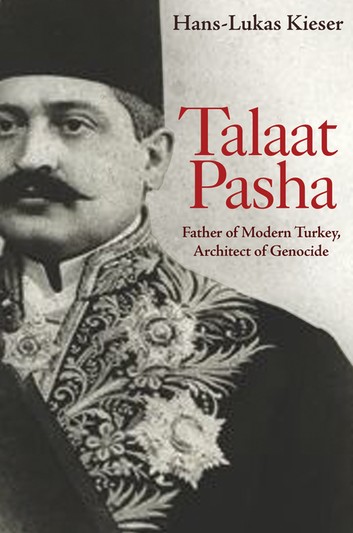

During the First World War, the Ottoman Empire was run by the Committee of Union and Progress (CUP). Within the CUP and in Ottoman politics in general, Talaat Bey (Pasha after 1917) played a decisive and leading role. Yet, until the publication of Hans-Lukas Kieser’s book Talaat Pasha: Founder of Turkey, Architect of the Genocide, there had not been a single biographical work about Talaat Bey in the English language. Thus, Kieser’s book has fulfilled a very significant gap in the literature.
Throughout this comprehensive work, Kieser explores the rise and fall of Talaat Bey, his approach to politics, his role in the planning and implementation of the Armenian Genocide, and the impact of his policies and activities on the establishment of the Turkish Republic. In addition to this, Talaat Pasha situates the history of the late Ottoman Empire into its European context, highlighting the links between developments in the Ottoman Empire and European politics in a variety of registers, including international politics and diplomacy, the rise of right-wing ideologies centered around victimhood and one-man regimes. As noted by Kieser, it was Talaat who opened “the age of extremes and the Europe of the dictators” (29).
Talaat Pasha opens with a thematical chapter with a focus on the year 1915. In this chapter, Kieser scrutinizes Talaat’s personal characteristics, as well as his approach to politics and relations, noting the “demolitionist” character of his policies. Chapter 2 focuses on the Hamidian period, examining revolutionary activism in the Ottoman Empire and Talaat’s role in establishing and enlarging the CUP networks under the shadow of other CUP leaders, such as Dr. Nazım and Bahaeddin Şakir, whose social capital were considerably higher than Talat’s. In Chapter 3, Kieser presents an analysis of the years following the 1908 Revolution, which forced the sultan Abdülhamid II into re-instating the constitution. In this chapter, Kieser provides important insights concerning Talaat’s rise to power, his moving away from parliamentary politics and constitutional ideals, and his adoption of a radical nationalist approach with an “imperial bias.” Chapter 4 focuses on the pre-war period, scrutinizing the monopolization of political power by the CUP after the 1913 putsch, the Balkan Wars and their impact on Talaat’s political approach, and the Armenian Reform Question that re-entered the international political agenda during the Balkan Wars. Through this examination, Kieser shows how Talaat shifted towards a more war prone and aggressive political stance. Chapter 5 starts with an examination of the CUP’s decision to enter the First World War. Kieser shows that rather than being passive agents dragged into war, CUP decision-makers, most importantly Talaat, were eager to enter the war and established forces around the Special Organization, attacking settlements across the border in the Eastern front, even before the entry of the Ottoman Empire into the war. In this chapter, Kieser shows the role of Talaat in the planning and implementation of the Armenian Genocide, highlighting the extent to which he micro-managed the process. Chapter 6 focuses on the last phase of the war. In this chapter, Kieser scrutinizes Talaat’s role in shaping Ottoman diplomacy in these times of trouble and his relations with the nationalist movement led by Mustafa Kemal, underlining the often understated or totally ignored fact that Talaat was personally involved in the promotion of the nationalist movement. This chapter also discusses the legacy of Talaat in Turkey and the ways in which his death opened a window for the emergence of public debates over the extermination of Armenians and the issue of German complicity in Germany.
Talaat Pasha, which is the product of thorough archival research in various archives, as well as of an examination of memoirs and secondary literature, provides important insights into the rise and fall of Talaat Pasha. As such, it will be of interest for scholars and students interested in a variety of issues including the Armenian Genocide, the First World War, Ottoman and Turkish history and the history of Middle East and Europe.
Reviewed by Mehmet Polatel, University of Michigan
Talaat Pasha: Founder of Modern Turkey, Architect of Genocide
By Hans-Lukas Kieser
Publisher: Princeton University Press
Hardcover / 532 pages / 2018
ISBN: 9780691157627
To read more book reviews click here.
Published on June 11, 2019.




